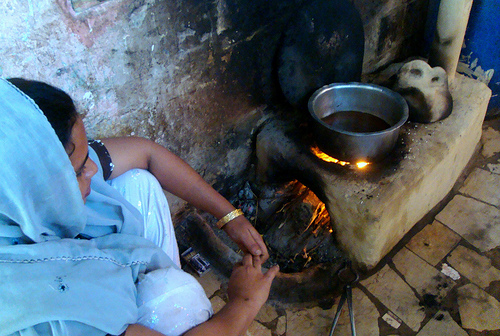By Stephen Leahy
RIO DE JANEIRO, Jun 21 (TerraViva) Over one billion people in the developing world could benefit from the Sustainable Energy for All initiative to bring electricity and clean-burning cookstoves to those without by 2030, U.N. officials said here June 21.

Some 2.7 billion people rely on traditional biomass such as wood or dung for cooking and heating. Credit: IPS
However, civil society is critical that the target communities are simply being treated as customers and not partners in this effort.
“Hundreds of millions will gain improved access to energy through grid extension and off-grid solutions, as well as scaled-up renewable energy sources,” said Kandeh Yumkella, director-general of the United Nations Industrial Development Organization (UNIDO) and head of UN-Energy.
Launched last fall, Sustainable Energy for All has three goals: ensure universal access to modern energy services; double the global rate of improvement in energy efficiency; and double the share of renewable energy in the global energy mix.
Worldwide, approximately 2.7 billion people rely on traditional biomass such as wood or dung for cooking and heating. Some 1.3 billion have no access to electricity, and up to a billion more only have access to unreliable electricity networks. Most energy-poor communities are concentrated in South Asia and sub-Saharan Africa.
“This initiative is being decided by an unaccountable hand-picked group dominated by representatives of multinational corporations and fossil fuel interests,” Nimmo Bassey, Nigerian environmentalist activist and chair of Friends of the Earth International (FOEI), told TerraViva.
Many of those involved have strong ties to the fossil fuel industry, including banks that finance and profit from new oil and gas development. The Bank of America is the world’s third largest coal financier, according a new FOEI report.
Other key players include Eskom, South Africa’s coal and electricity utility, Brazil’s largest power utility Electrobras, along with oil and gas companies Statoil and Duke Energy. Former CEOs of Shell and BP are also involved. The sole independent representative of civil society is the Barefoot College of India, says the report, “Reclaim the UN”.
FOEI and a broad coalition of 107 NGOs want energy access to be improved through community-controlled small-scale sustainable energy projects.
They are calling on the U.N. secretary-general to open up the process to affected and marginalised communities so they can be full participants.
Bassey and others are increasingly concerned that U.N. organisations are being dominated by corporate interests, particularly in the areas of energy, agriculture and food, water and the financialisation of nature.
“As it stands currently, ‘sustainable energy for all’ will fail spectacularly in its goal of tackling climate change and poverty,” he said.







 Add to Google
Add to Google







